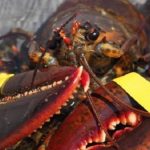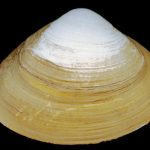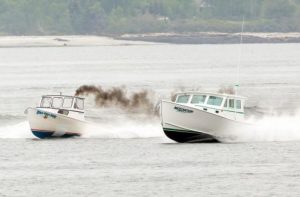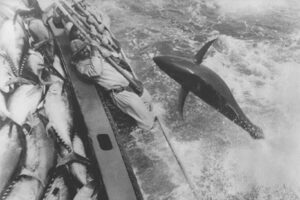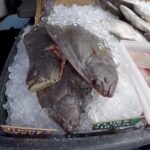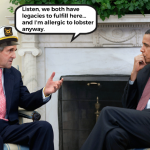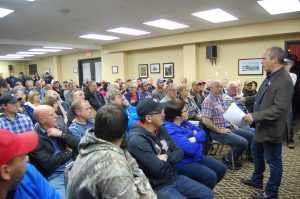Tag Archives: Oregon Fish and Wildlife Commission
Oregon crabbers and environmentalists are at odds as a commission votes on rules to protect whales
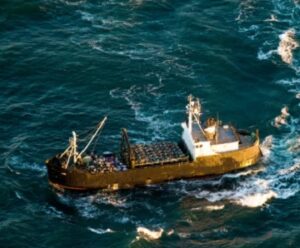 In the wheelhouse of a crab boat named Heidi Sue, Mike Pettis watched the gray whale surface and shoot water through its blowhole. Tangled around its tail was a polypropylene rope used to pull up crab traps. That was in 2004, off the waters of Waldport, Oregon. Pettis, a crab fisherman, said it’s the only time in his 44 years of fishing he has ever seen a whale caught in crab lines, and he believes that is proof such encounters are “extremely rare.” The Oregon Fish and Wildlife Commission is expected to vote Friday on whether to permanently set stricter rules and pot limits put in place in 2020 to protect whales. The restrictions, which were originally supposed to end after this season, would reduce the number of traps, known as pots, and how deep they can drop in the spring and summer months when humpbacks are more likely to encounter them. >click to read< 09:01
In the wheelhouse of a crab boat named Heidi Sue, Mike Pettis watched the gray whale surface and shoot water through its blowhole. Tangled around its tail was a polypropylene rope used to pull up crab traps. That was in 2004, off the waters of Waldport, Oregon. Pettis, a crab fisherman, said it’s the only time in his 44 years of fishing he has ever seen a whale caught in crab lines, and he believes that is proof such encounters are “extremely rare.” The Oregon Fish and Wildlife Commission is expected to vote Friday on whether to permanently set stricter rules and pot limits put in place in 2020 to protect whales. The restrictions, which were originally supposed to end after this season, would reduce the number of traps, known as pots, and how deep they can drop in the spring and summer months when humpbacks are more likely to encounter them. >click to read< 09:01
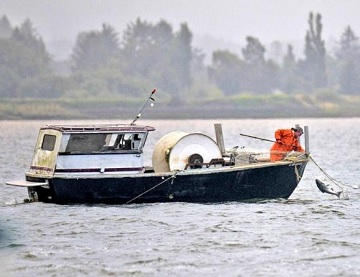
Oregon: Return to evenhanded salmon management
In Astoria in April, the Oregon Fish and Wildlife Commission learned there’s still plenty of life in commercial fishing. This may have come as a surprise, considering how some sport fishing groups have mischaracterized the industry as irrelevant. Since Washington state and Oregon co-manage Columbia River fisheries, the commission’s policies take on great importance for all who value the continuing economic and social benefits of traditional industries. Of these, salmon fishing is so deeply entwined in local culture that it may be said to comprise a key element of our heritage. Still in need of a course correction are misguided policies dictated by former Oregon Gov. John Kitzhaber. >click to read< 07:55
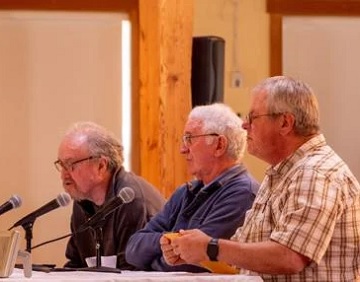
Fishermen urge Oregon Fish and Wildlife Commission to revisit regulations
Several local commercial fishermen have asked the Oregon Fish and Wildlife Commission to reconsider Columbia River fishing regulations. During the public forum section of the commission’s meeting in Astoria on Friday, commercial fishermen and those connected with the industry asked the commission to revisit gillnetting regulations and salmon buyback options. Jim Coleman, a fisherman from St. Helens, asked commissioners to add gillnetting to a future agenda or to work with Washington state to ensure the option of a 6-inch gillnet in the fall. “The gillnet-caught Copper River King salmon is flown from Alaska to Seattle on a chartered jet with great fanfare, demanding $70 to $80 a pound, while commercial fishing on the Columbia River is a political football,” >click to read< 12:18
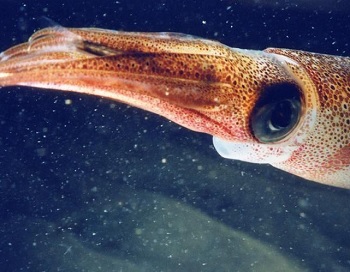
Oregon: State regulators rushing to catch up on market squid fishery
If Joe Mulkey could fish for market squid year-round, he would. The emerging Oregon fishery ticks a lot of boxes for the commercial fisherman from Reedsport: the use of seine gear and electronics, and, of course, the recent profitability. In the past five years, the market squid fishery has moved from almost nonexistent to booming. Now boats that would normally fish for squid in California’s Monterey Bay have headed north and Oregon fishermen are seeing new opportunities in local waters, hunting the small, short-lived animals. >click to read< 18:55
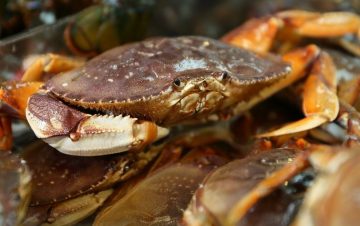
Oregon F&W Commission adopts 1st Dungeness Crab FMP to be developed on the West Coast
The Oregon Fish and Wildlife Commission has adopted regulations for implementing the Oregon Dungeness Crab Fishery Management Plan. The FMP describes the status of Dungeness crab and the Oregon Department of Fish and Wildlife management of two commercial crab fisheries, bay and ocean, and the recreational crab fishery in the bays and ocean. While the majority of regulations are already in place for the management described in the FMP,,, >click to read< 10:01
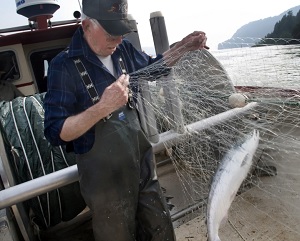
Oregon suspends Columbia River reforms review, Spring Chinook allocation also in question
The Lower Mainstem Columbia River Fisheries Management Reforms were heavily negotiated and meant to ensure concurrency between the states of Washington and Oregon concerning salmon fishing rules on the Columbia River. It also provides a mechanism to move gill and tangle net commercial salmon fishing off the main stem of the river, and into off-channel fisheries. After five years, the states opened a review of the policy. Each state appointed three members of their fish and wildlife commissions to the Policy Review Committee, (PRC). The committee would then refer possible changes to the policy for eventual action by the full commissions. >click to read< 09:33
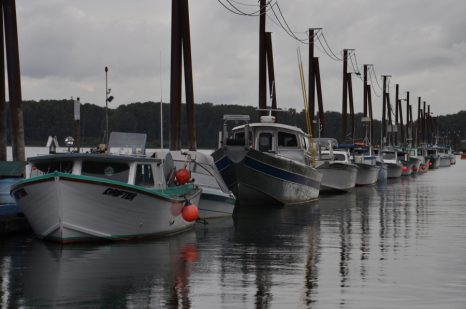
Columbia River Reforms – Both sides on gillnet issue dig in
A crucial vote concerning the Columbia River Reforms regarding gillnets will be taken by the full Oregon Fish and Wildlife Commission at a meeting on June 6-7 in Salem It will determine whether the alterations suggested by the joint-state task force will be adopted.,,, Former Washington commissioners and fisheries scientists have also weighed in with a letter to the legislature, and groups that oppose or endorse the changes have rallied the troops. >click to read<10:28
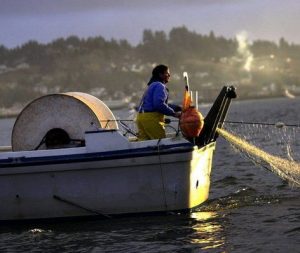
In major reversal, WA agrees to gillnets on Columbia in 2019
The Washington Fish and Wildlife Commission agreed last week to allow the use of gillnets during the fall salmon fishery on the Lower Columbia River while state fishery managers work with Oregon counterparts to develop a joint long-term policy for shared waters. The commission, appointed by the governor to set policy for the Washington Department of Fish and Wildlife, took that action and received public comments on proposed hunting seasons for 2019-21 during a public meeting March 1-2 in Spokane. The commission’s action to extend the use of gillnets was one of a number of recommendations for Columbia River fisheries developed by a joint committee with members of the Oregon Fish and Wildlife Commission. Oregon’s full commission will also consider the recommendations when it meets later this month. >click to read<Reposted from yesterday 15:53
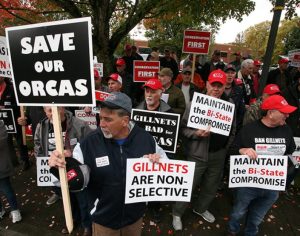
Feud over gill nets boils again
The Washington Fish and Wildlife Commission held a series of meetings at the Heathman Lodge in Vancouver from Thursday through Saturday to receive a report from state staff on the Columbia River Basin Salmon Management Policy C-3620, and review the results of that policy. During the Thursday meeting the WDWC was joined by the Oregon Fish and Wildlife Commission. While the commissions heard the report and reviewed possible options for the future of the policy, members of the Coastal Conservation Association (CCA) gathered outside the lodge to protest the prospect of the commission’s abandoning the policy entirely, which is one option being considered. >click to read<11:34
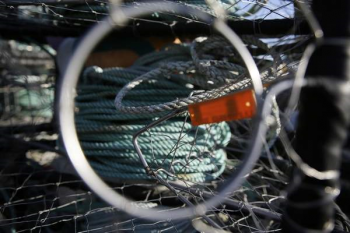
Oregon Fish and Wildlife Commission adopts new rules for Dungeness crab
Harmful algal blooms complicated commercial Dungeness crab seasons on the Oregon Coast for the past three seasons, threatening the viability of the state’s most valuable fishery.,,The new rules outline evisceration protocols that go into place when levels of the naturally occurring marine toxin domoic acid spike. The toxin can accumulate at high levels in a crab’s guts, but remove the guts and the meat is still safe to eat. The rules also establish 12 distinct crabbing zones on the Oregon Coast, narrowing the areas that can be closed or opened at any given time. >click to read<22:42
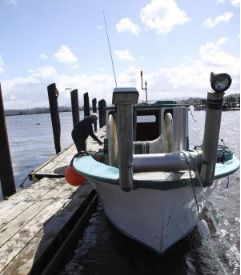
Oregon Fish and Wildlife commissioners back gillnetters
The Oregon Fish and Wildlife Commission is again pushing for commercial salmon fishermen to get time on the Columbia River. Oregon and Washington state adopted a policy nearly six years ago to slowly phase gillnetters off the river’s main stem, but Oregon has second-guessed the wisdom of the decision. The five commissioners at a meeting in Astoria on Friday said they supported looking into a summer Chinook salmon season for gillnetters — something they attempted to do last year. Commissioners walked back that move, however, after Gov. Kate Brown instructed them to align with her administration and Washington state. >click to read<21:04
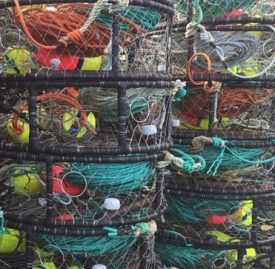
Oregon considers new rules for crab
As closures related to harmful marine toxins continue to plague Oregon’s lucrative commercial Dungeness crab fishery, new rules are under consideration that will help state fishery managers trace crab after it is caught and respond with more flexibility. In April, the Oregon Fish and Wildlife Commission will consider making permanent several rules introduced this crab season. A related bill is working its way through the Legislature. >click to read< 11:25
Editorial: Fishermen should look for smart ways to survive
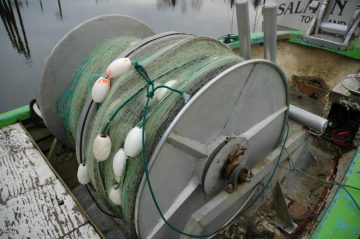 As spring Chinook salmon congregate in the ocean around the mouth of the Columbia River in anticipation of their ancient migration to upriver spawning grounds, this spring also sees a swirling conglomeration of politics in Oregon and Washington state over how to allocate salmon among different interests. In some ways nothing new, in other respects the fight over salmon is rising to a higher pitch. Increasingly involving elected leaders, the outcome is becoming even less predictable. Also unclear is where a majority of Oregon and Washington state voters stand on the issue. The key point of recent news in the matter is the Oregon Fish and Wildlife Commission’s unanimous vote to curtail gillnet fish harvests, altering an earlier decision that was more favorable to commercial fishermen. Bullied into the decision by Gov. Kate Brown, the commission backed away from its earlier acknowledgment that the states have so far failed to keep a promise made by the Oregon Legislature to ensure the continuing economic viability of the commercial fleet. Alternative fishing methods have proven ineffective, alternative fishing grounds are in short supply, and money has been slow to arrive to aid transition away from the decades long gillnetting tradition. continue reading the op-ed here 16:20
As spring Chinook salmon congregate in the ocean around the mouth of the Columbia River in anticipation of their ancient migration to upriver spawning grounds, this spring also sees a swirling conglomeration of politics in Oregon and Washington state over how to allocate salmon among different interests. In some ways nothing new, in other respects the fight over salmon is rising to a higher pitch. Increasingly involving elected leaders, the outcome is becoming even less predictable. Also unclear is where a majority of Oregon and Washington state voters stand on the issue. The key point of recent news in the matter is the Oregon Fish and Wildlife Commission’s unanimous vote to curtail gillnet fish harvests, altering an earlier decision that was more favorable to commercial fishermen. Bullied into the decision by Gov. Kate Brown, the commission backed away from its earlier acknowledgment that the states have so far failed to keep a promise made by the Oregon Legislature to ensure the continuing economic viability of the commercial fleet. Alternative fishing methods have proven ineffective, alternative fishing grounds are in short supply, and money has been slow to arrive to aid transition away from the decades long gillnetting tradition. continue reading the op-ed here 16:20
Oregon adopts Columbia River salmon reforms
 Oregon’s Fish and Wildlife Commission took another try Friday at adopting Columbia River salmon management reforms, but it’s still unclear if the policies will satisfy Washington’s commission. In January, the Oregon commission adopted revised reforms which were more friendly to gillnet fishermen. Following a backlash from sportsmen, Oregon Gov. Kate Brown sent the Oregon commission a scolding letter that directed the panel adopt a position closer to the details adopted in 2013 and more akin to Washington’s position. Oregon commission member Greg Wolley of Portland said he got a call from Brown on Thursday. The proposal adopted on Friday meets the spirit of her letter and the compromise Brown wanted, Wolley said. Brad Smith, chairman of the Washington Fish and Wildlife Commission, sent a letter to Michael Finley, his Oregon counterpart, on Wednesday indicating that Washington felt the plan it adopted in January already was a compromise from the original 2012 agreement. “I’m really uncomfortable with this,’’ said Oregon commission member Holly Akenson of Enterprise, who added the plan does not do enough for commercial fishermen. Read the story here 09:09
Oregon’s Fish and Wildlife Commission took another try Friday at adopting Columbia River salmon management reforms, but it’s still unclear if the policies will satisfy Washington’s commission. In January, the Oregon commission adopted revised reforms which were more friendly to gillnet fishermen. Following a backlash from sportsmen, Oregon Gov. Kate Brown sent the Oregon commission a scolding letter that directed the panel adopt a position closer to the details adopted in 2013 and more akin to Washington’s position. Oregon commission member Greg Wolley of Portland said he got a call from Brown on Thursday. The proposal adopted on Friday meets the spirit of her letter and the compromise Brown wanted, Wolley said. Brad Smith, chairman of the Washington Fish and Wildlife Commission, sent a letter to Michael Finley, his Oregon counterpart, on Wednesday indicating that Washington felt the plan it adopted in January already was a compromise from the original 2012 agreement. “I’m really uncomfortable with this,’’ said Oregon commission member Holly Akenson of Enterprise, who added the plan does not do enough for commercial fishermen. Read the story here 09:09
Steelheaders call for Buckmaster’s removal from fish commission
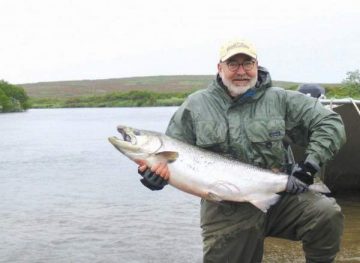 In the latest development in the feud between sports anglers and commercial fishermen over the use of gillnets in the lower Columbia River, a sports angling group is petitioning the governor to remove a state fish and wildlife commissioner who voted with three others to continue to allow the practice in late January. The Association of Northwest Steelheaders submitted a petition last week signed by nearly 6,000 people calling on Gov. Kate Brown to remove Commissioner Bruce Buckmaster. Buckmaster, a Brown appointee, has served on the Oregon Fish and Wildlife Commission since 2015. Detractors argued at the time he was a lobbyist for the commercial gillnetting industry, a claim which Buckmaster denied. continue reading the article here 21:08
In the latest development in the feud between sports anglers and commercial fishermen over the use of gillnets in the lower Columbia River, a sports angling group is petitioning the governor to remove a state fish and wildlife commissioner who voted with three others to continue to allow the practice in late January. The Association of Northwest Steelheaders submitted a petition last week signed by nearly 6,000 people calling on Gov. Kate Brown to remove Commissioner Bruce Buckmaster. Buckmaster, a Brown appointee, has served on the Oregon Fish and Wildlife Commission since 2015. Detractors argued at the time he was a lobbyist for the commercial gillnetting industry, a claim which Buckmaster denied. continue reading the article here 21:08
Oregon seeks compromise on Columbia salmon fishing reforms
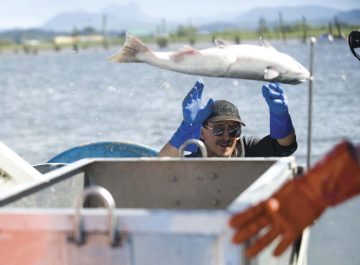 The chairman of the Oregon Fish and Wildlife Commission has offered to compromise with the Washington commission over their differences regarding the Columbia River salmon reforms. Earlier this year, the two state commissions approved reforms starting this year in how salmon are allocated between sport and commercial fishermen and allowable commercial fishing methods. Oregon opted for a plan more friendly to commercial fishing than did the Washington Fish and Wildlife Commission. Oregon Gov. Kate Brown then scolded the Oregon commission for reneging on a 2013 agreement to limit gillnetting to off-channel areas and told it to change the policy by April 3. Michael Finley, chair of the Oregon commission, sent a letter to Brad Smith, chair of the Washington commission, on Tuesday detailing his compromise proposals. By species, here is a look at Finley’s proposals: continue reading the story here 09:26
The chairman of the Oregon Fish and Wildlife Commission has offered to compromise with the Washington commission over their differences regarding the Columbia River salmon reforms. Earlier this year, the two state commissions approved reforms starting this year in how salmon are allocated between sport and commercial fishermen and allowable commercial fishing methods. Oregon opted for a plan more friendly to commercial fishing than did the Washington Fish and Wildlife Commission. Oregon Gov. Kate Brown then scolded the Oregon commission for reneging on a 2013 agreement to limit gillnetting to off-channel areas and told it to change the policy by April 3. Michael Finley, chair of the Oregon commission, sent a letter to Brad Smith, chair of the Washington commission, on Tuesday detailing his compromise proposals. By species, here is a look at Finley’s proposals: continue reading the story here 09:26
Governor Brown’s interference pits her against commercial fisherman
 In an astoundingly ignorant and heavy-handed display of putting urban political correctness ahead of rural jobs, Gov. Kate Brown last week dictated that the citizen members of the Oregon Fish and Wildlife Commission reverse their January decision that gave commercial fishermen a minimally fair share of the Columbia River’s salmon allocation. Addressing commissioners as if they are misbehaving children, Brown told Chairman Michael Finley the commission majority’s acknowledgment of reality is “not acceptable” and that “I expect” the commission to acquiesce to her interpretation of the facts by April 3. Fish and Wildlife Commission members are in an infinitely better position to judge the ineffectiveness of salmon policies than is the governor. Read the Op-ed here 17:03
In an astoundingly ignorant and heavy-handed display of putting urban political correctness ahead of rural jobs, Gov. Kate Brown last week dictated that the citizen members of the Oregon Fish and Wildlife Commission reverse their January decision that gave commercial fishermen a minimally fair share of the Columbia River’s salmon allocation. Addressing commissioners as if they are misbehaving children, Brown told Chairman Michael Finley the commission majority’s acknowledgment of reality is “not acceptable” and that “I expect” the commission to acquiesce to her interpretation of the facts by April 3. Fish and Wildlife Commission members are in an infinitely better position to judge the ineffectiveness of salmon policies than is the governor. Read the Op-ed here 17:03
Gov. Kate Brown puts political correctness above jobs
 In an astoundingly ignorant and heavy-handed display of putting urban political correctness ahead of rural jobs, Gov. Kate Brown last week dictated that the citizen members of the Oregon Fish and Wildlife Commission reverse their January decision that gave commercial fishermen a minimally fair share of the Columbia River’s salmon allocation. Addressing commissioners as if they are misbehaving children, Brown told Chairman Michael Finley the commission majority’s acknowledgment of reality is “not acceptable” and that “I expect” the commission to acquiesce to her interpretation of the facts by April 3. The commission agreed at a meeting on Friday in Tigard to take up the issue in March. Many of the most important facts are not in dispute: Former Gov. John Kitzhaber’s dictated abandonment of decades of carefully nuanced salmon policy has not worked. Kicking commercial fishermen off the Columbia’s main stem as of Dec. 31, 2016, as Kitzhaber’s plan called for, is manifestly unjust and will hurt the economy of Clatsop County and other fishing-dependent communities. Continue reading the Op-ed here 07:41
In an astoundingly ignorant and heavy-handed display of putting urban political correctness ahead of rural jobs, Gov. Kate Brown last week dictated that the citizen members of the Oregon Fish and Wildlife Commission reverse their January decision that gave commercial fishermen a minimally fair share of the Columbia River’s salmon allocation. Addressing commissioners as if they are misbehaving children, Brown told Chairman Michael Finley the commission majority’s acknowledgment of reality is “not acceptable” and that “I expect” the commission to acquiesce to her interpretation of the facts by April 3. The commission agreed at a meeting on Friday in Tigard to take up the issue in March. Many of the most important facts are not in dispute: Former Gov. John Kitzhaber’s dictated abandonment of decades of carefully nuanced salmon policy has not worked. Kicking commercial fishermen off the Columbia’s main stem as of Dec. 31, 2016, as Kitzhaber’s plan called for, is manifestly unjust and will hurt the economy of Clatsop County and other fishing-dependent communities. Continue reading the Op-ed here 07:41
Oregon did the right thing in backing off gillnet ban on the main Columbia River. Washington state should too.
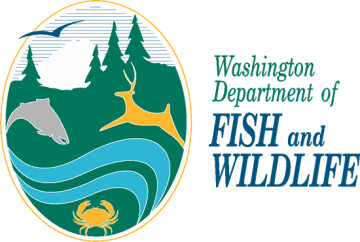 The Oregon Fish and Wildlife Commission is to be commended for recognizing that a 2013 policy dictated by former Gov. John Kitzhaber to kick commercial salmon fishing off the Columbia River has failed. It isn’t just Lower Columbia River residents who think so. Bobby Levy, former commission chair, commented on Facebook, “Oregon Fish and Wildlife commissioners did the fair and right thing! I applaud you!!” Levy led the commission in 2012 and 2013 when the two fish and wildlife commissions of Oregon and Washington state headed down the path to implementing the Kitzhaber scheme. Never fully thought out, gutting a centurylong tradition of supplying local consumers with some of the salmon we support with our taxes and electric rates was largely the product of intense lobbying by one subset of recreational fishing, embodied by the Northwest Sportsfishing Industry Association. A long-successful alliance between different salmon-fishing interests was cast aside, resulting in a loss of important unified advocacy for salmon recovery in the Columbia estuary and basin. Evicting gillnetters from the main stem of the Columbia by the end of 2016 was premised on a number of assumptions, including: Read the rest of the op-ed here 08:29
The Oregon Fish and Wildlife Commission is to be commended for recognizing that a 2013 policy dictated by former Gov. John Kitzhaber to kick commercial salmon fishing off the Columbia River has failed. It isn’t just Lower Columbia River residents who think so. Bobby Levy, former commission chair, commented on Facebook, “Oregon Fish and Wildlife commissioners did the fair and right thing! I applaud you!!” Levy led the commission in 2012 and 2013 when the two fish and wildlife commissions of Oregon and Washington state headed down the path to implementing the Kitzhaber scheme. Never fully thought out, gutting a centurylong tradition of supplying local consumers with some of the salmon we support with our taxes and electric rates was largely the product of intense lobbying by one subset of recreational fishing, embodied by the Northwest Sportsfishing Industry Association. A long-successful alliance between different salmon-fishing interests was cast aside, resulting in a loss of important unified advocacy for salmon recovery in the Columbia estuary and basin. Evicting gillnetters from the main stem of the Columbia by the end of 2016 was premised on a number of assumptions, including: Read the rest of the op-ed here 08:29
Oregon will defy joint fish management on the lower Columbia River
 The Oregon Fish and Wildlife Commission ripped a hole Friday in the 99-year-old fabric of concurrent fish management on the Columbia River. With a split 4-3 vote, commission members defied the Washington Fish and Wildlife Commission’s attempt to negotiate the long-contested Columbia River Management Plan. The plan required a switch from gill-netting to selective commercial fishing on the mainstem below Bonneville Dam. It also gave priority allocation of mainstem salmon harvest to sport anglers. Friday’s vote, however, indefinitely extends gill-netting for fall chinook salmon from Sauvie Island to Bonneville Dam and for summer chinook in the entire lower river. Read the story here 07:28
The Oregon Fish and Wildlife Commission ripped a hole Friday in the 99-year-old fabric of concurrent fish management on the Columbia River. With a split 4-3 vote, commission members defied the Washington Fish and Wildlife Commission’s attempt to negotiate the long-contested Columbia River Management Plan. The plan required a switch from gill-netting to selective commercial fishing on the mainstem below Bonneville Dam. It also gave priority allocation of mainstem salmon harvest to sport anglers. Friday’s vote, however, indefinitely extends gill-netting for fall chinook salmon from Sauvie Island to Bonneville Dam and for summer chinook in the entire lower river. Read the story here 07:28
Sportsmen, commercials feud over Columbia River reforms
 Sport fishermen from Southwest Washington repeatedly exhorted the state Fish and Wildlife Commission on Saturday to implement fully in 2017 the most sweeping reforms in Columbia River salmon management in decades. And their commercial foes, also from Southwest Washington, were equally strident that the plan adopted four years ago to eliminate gillnetting from the main river and to prioritize angling has been fraught with problems in the 2013-16 transition period. The nine-member citizen panel will meet Jan. 13 and 14 in Vancouver to make its decision. The Oregon Fish and Wildlife Commission is going through similar deliberations, then the two states will need to reconcile any differences in their policies. Reforms adopted by both states in early 2013 allocated more chinook salmon to sportsmen in the main Columbia and restricted gillnetting to off-channel sites like Youngs Bay near Astoria. The reforms also called for commercial fishing that remained in the main Columbia to be done with live-capture methods — such as purse seines and beach seines — designed to harvest hatchery stocks and release wild fish. Read the rest here 08:20
Sport fishermen from Southwest Washington repeatedly exhorted the state Fish and Wildlife Commission on Saturday to implement fully in 2017 the most sweeping reforms in Columbia River salmon management in decades. And their commercial foes, also from Southwest Washington, were equally strident that the plan adopted four years ago to eliminate gillnetting from the main river and to prioritize angling has been fraught with problems in the 2013-16 transition period. The nine-member citizen panel will meet Jan. 13 and 14 in Vancouver to make its decision. The Oregon Fish and Wildlife Commission is going through similar deliberations, then the two states will need to reconcile any differences in their policies. Reforms adopted by both states in early 2013 allocated more chinook salmon to sportsmen in the main Columbia and restricted gillnetting to off-channel sites like Youngs Bay near Astoria. The reforms also called for commercial fishing that remained in the main Columbia to be done with live-capture methods — such as purse seines and beach seines — designed to harvest hatchery stocks and release wild fish. Read the rest here 08:20
ODFW Commission extends Columbia River reform plan by one year
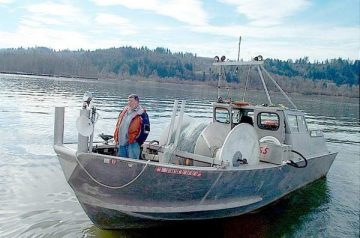 The Oregon Fish and Wildlife Commission on Friday voted to extend by one year a reform policy that would ban gillnetting on the main stem of the Columbia River. The extension of the transition period runs through 2017, giving commissioners some breathing room to refine the policy, which was meant to help endangered salmon and steelhead. “The extension will allow for more consideration by commission members and consultation with management partners,” according to a release from commission staff. The Fish and Wildlife Commission has been reviewing whether to rebalance the Columbia River reform policy and allow limited use of gillnets on the river’s main stem rather than phase the practice out entirely. Oregon and Washington state agreed to eliminate gillnetting on the main stem over four years, encourage commercial fishermen to use alternative gear or off-channel areas, and increase opportunities for sport fishing. Commercial fishermen have fought the policy change since 2012 as a potentially devastating financial blow, as well as the end of a way of life for generations who have worked the river. Read the rest here 09:42
The Oregon Fish and Wildlife Commission on Friday voted to extend by one year a reform policy that would ban gillnetting on the main stem of the Columbia River. The extension of the transition period runs through 2017, giving commissioners some breathing room to refine the policy, which was meant to help endangered salmon and steelhead. “The extension will allow for more consideration by commission members and consultation with management partners,” according to a release from commission staff. The Fish and Wildlife Commission has been reviewing whether to rebalance the Columbia River reform policy and allow limited use of gillnets on the river’s main stem rather than phase the practice out entirely. Oregon and Washington state agreed to eliminate gillnetting on the main stem over four years, encourage commercial fishermen to use alternative gear or off-channel areas, and increase opportunities for sport fishing. Commercial fishermen have fought the policy change since 2012 as a potentially devastating financial blow, as well as the end of a way of life for generations who have worked the river. Read the rest here 09:42
Sport groups pressure Oregon governor to stop changes in Columbia River net plan
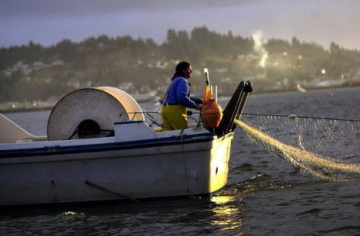 Four powerful sportfishing groups have asked Oregon Gov. Kate Brown to keep the Oregon Fish and Wildlife Commission from significantly altering a plan to move gill-nets from the lower Columbia River in 2017. In a stern letter delivered Monday to the governor and commission, the coalition threatens to withdraw support from the Oregon Department of Fish and Wildlife if a revision to the Columbia River Plan is adopted. It was signed by representatives of the Northwest Sportfishing Industry Association, Association of Northwest Steelheaders, Coastal Conservation Association and the Northwest Guides and Anglers Association. Read the rest here 11:06
Four powerful sportfishing groups have asked Oregon Gov. Kate Brown to keep the Oregon Fish and Wildlife Commission from significantly altering a plan to move gill-nets from the lower Columbia River in 2017. In a stern letter delivered Monday to the governor and commission, the coalition threatens to withdraw support from the Oregon Department of Fish and Wildlife if a revision to the Columbia River Plan is adopted. It was signed by representatives of the Northwest Sportfishing Industry Association, Association of Northwest Steelheaders, Coastal Conservation Association and the Northwest Guides and Anglers Association. Read the rest here 11:06
Gillnetters: Kitzhaber plan doesn’t deliver
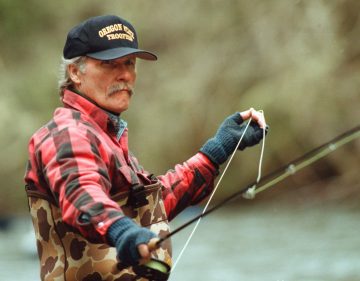 Lower Columbia River gillnetters told the Oregon Fish and Wildlife Commission Nov. 9 that fishery harvest reforms initiated in 2013 are not working economically, while salmon and steelhead anglers accused the commission of vacating its promise to get gillnetters off the river. As many as 150 people attended the Salem commission meeting and public forum on mainstem fishery harvest reforms, where comments were heard on a proposal by ODFW that would continue gillnetting in some areas of the mainstem river. The harvest reform package, also known as the Kitzhaber plan, is in its final year of transition and was to become fully effective at the beginning of 2017 when all Columbia River mainstem fishing would be allocated to recreational anglers and commercial gillnetters would fish in off-channel select areas, mostly in the lower river and mostly for hatchery chinook and coho salmon. However, the reform also promised to keep gillnetters economically whole, but the actual plan implementation is lagging in hatchery production of smolts, identifying additional off-channel areas and developing alternative gear that would allow commercial fishers to better target hatchery fish, among other issues. Read the rest here 10:41
Lower Columbia River gillnetters told the Oregon Fish and Wildlife Commission Nov. 9 that fishery harvest reforms initiated in 2013 are not working economically, while salmon and steelhead anglers accused the commission of vacating its promise to get gillnetters off the river. As many as 150 people attended the Salem commission meeting and public forum on mainstem fishery harvest reforms, where comments were heard on a proposal by ODFW that would continue gillnetting in some areas of the mainstem river. The harvest reform package, also known as the Kitzhaber plan, is in its final year of transition and was to become fully effective at the beginning of 2017 when all Columbia River mainstem fishing would be allocated to recreational anglers and commercial gillnetters would fish in off-channel select areas, mostly in the lower river and mostly for hatchery chinook and coho salmon. However, the reform also promised to keep gillnetters economically whole, but the actual plan implementation is lagging in hatchery production of smolts, identifying additional off-channel areas and developing alternative gear that would allow commercial fishers to better target hatchery fish, among other issues. Read the rest here 10:41
Sportfishing boat builder appointed to Oregon Fish and Wildlife Commission
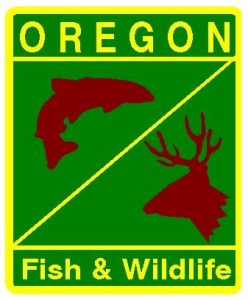 Jim Bittle of Central Point, owner of Willie Boats, Inc., in Medford, has been nominated by Gov. Kate Brown to replace Jason Atkinson of Jacksonville on the Oregon Fish and Wildlife Commission. Atkinson has asked to be replaced. His term expires in 2019. Bittle, known for his business savvy, leadership and advocacy for fish and sportfishing, has owned Willie Boats, Inc., since the 2007 passing of its founder, Willie Illingworth. His appointment has already been applauded by sportfishing leaders as a balance to another Gov. Brown appointee last year, Bruce Buckmaster of Astoria, a long-time supporter of commercial fishing. Also up for reappointment are commissioners Greg Wolley of Portland and Laura Anderson of Newport. The Oregon Senate is scheduled to consider their confirmations in December. link 13:35
Jim Bittle of Central Point, owner of Willie Boats, Inc., in Medford, has been nominated by Gov. Kate Brown to replace Jason Atkinson of Jacksonville on the Oregon Fish and Wildlife Commission. Atkinson has asked to be replaced. His term expires in 2019. Bittle, known for his business savvy, leadership and advocacy for fish and sportfishing, has owned Willie Boats, Inc., since the 2007 passing of its founder, Willie Illingworth. His appointment has already been applauded by sportfishing leaders as a balance to another Gov. Brown appointee last year, Bruce Buckmaster of Astoria, a long-time supporter of commercial fishing. Also up for reappointment are commissioners Greg Wolley of Portland and Laura Anderson of Newport. The Oregon Senate is scheduled to consider their confirmations in December. link 13:35
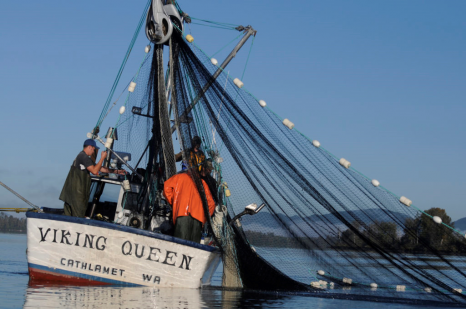
Oregon proposes ‘rebalance’ of Columbia River salmon reforms
The Oregon Department of Fish and Wildlife is proposing a “strategic rebalance” of the landmark 2012 Columbia River salmon management reforms, including continuation of gillnetting for fall chinook between Woodland and Beacon Rock. The department’s recommendations will be presented to the Oregon Fish and Wildlife Commission in a one-topic, all-day meeting beginning at 8 a.m. Wednesday at the Department of Fish and Wildlife headquarters, 4034 Fairview Industrial Drive, Salem. In late 2012 and early 2013, the Washington and Oregon commissions adopted the biggest overhaul of Columbia River salmon policies in seven decades. Jump-started by former Oregon Gov. John Kitzhaber, the policies called for allocating more chinook salmon to sportsmen in the main Columbia and restricting gillnetting to off-channel sites like Youngs Bay near Astoria. Among recommendations for 2017 developed by the Oregon Department of Fish and Wildlife are: Read the rest here 11:17
A Fish And Wildlife Seat Up For Grabs, With High Stakes
 Openings on the Oregon Fish and Wildlife Commission have sport fishing groups eyeing an opportunity to gain a voice while some environmental groups worry they’ll lose one. Two members are up for reappointment and another seat is vacant on the commission, which sets natural resource policies ranging from hunting and fishing rules to last year’s decision to remove gray wolves from the endangered list. Recreational anglers hope one of their longtime advocates, Liz Hamilton, can become one of the seven members of the commission, which they say has tilted too far toward commercial fishing interests. Hamilton runs the Northwest Sportfishing Industry Association. She submitted a letter of interest to Oregon Gov. Kate Brown earlier this summer expressing her interest in joining the commission. It included endorsements from Sen. Ron Wyden and Reps. Earl Blumenauer and Kurt Schrader, along with several prominent figures from the sport fishing community. Environmental groups are supporting the reappointment of Greg Wolley, who they consider one of the commission’s strongest voice for conservation. He is also the first and only African-American member of the commission. Read the story here 10:14
Openings on the Oregon Fish and Wildlife Commission have sport fishing groups eyeing an opportunity to gain a voice while some environmental groups worry they’ll lose one. Two members are up for reappointment and another seat is vacant on the commission, which sets natural resource policies ranging from hunting and fishing rules to last year’s decision to remove gray wolves from the endangered list. Recreational anglers hope one of their longtime advocates, Liz Hamilton, can become one of the seven members of the commission, which they say has tilted too far toward commercial fishing interests. Hamilton runs the Northwest Sportfishing Industry Association. She submitted a letter of interest to Oregon Gov. Kate Brown earlier this summer expressing her interest in joining the commission. It included endorsements from Sen. Ron Wyden and Reps. Earl Blumenauer and Kurt Schrader, along with several prominent figures from the sport fishing community. Environmental groups are supporting the reappointment of Greg Wolley, who they consider one of the commission’s strongest voice for conservation. He is also the first and only African-American member of the commission. Read the story here 10:14
Oregon commission reviews impact of Former Governor Kitzhaber fishery harvest reform plan
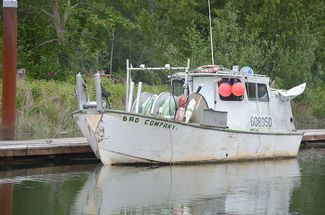 The Oregon Fish and Wildlife Commission at its March meeting reviewed fishery harvest reforms on the Columbia River that effectively remove commercial gillnetters from the mainstem river by 2017 but allows gillnetting in the lower river in select areas. The three-year transition will be complete by next year. It consists of harvest allocation shifts, with recreational anglers taking a larger chunk of the mainstem fishing while commercial fishing transitions to select off-channel areas, such as Youngs Bay and Knappa and Blind sloughs in Oregon, and Deep River and eventually to the Cathlamet Channel, all in the lower Columbia River estuary. Read the rest here 08:22
The Oregon Fish and Wildlife Commission at its March meeting reviewed fishery harvest reforms on the Columbia River that effectively remove commercial gillnetters from the mainstem river by 2017 but allows gillnetting in the lower river in select areas. The three-year transition will be complete by next year. It consists of harvest allocation shifts, with recreational anglers taking a larger chunk of the mainstem fishing while commercial fishing transitions to select off-channel areas, such as Youngs Bay and Knappa and Blind sloughs in Oregon, and Deep River and eventually to the Cathlamet Channel, all in the lower Columbia River estuary. Read the rest here 08:22
Ocean salmon seasons set by PFMC, pending NMFS final approval
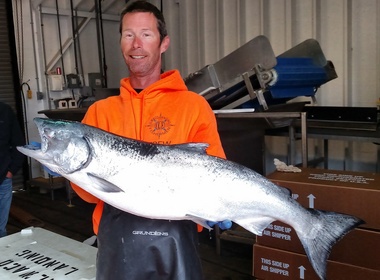 The Pacific Fishery Management Council struggled through week-long negotiations over widely contrasting salmon outlooks before setting sport and commercial rules for coastal Oregon, Washington and California on Thursday afternoon. Its decisions still require approval by the National Marine Fisheries Service. Chinook salmon fishing will be allowed from all ports, with reduced commercial seasons bearing the brunt of cutbacks in southerly waters. The Oregon Fish and Wildlife Commission will adopt ocean salmon regulations for state waters at its April 22 meeting in Bandon. The commission typically matches regulations set by the Management Council. Read the article here 11:19
The Pacific Fishery Management Council struggled through week-long negotiations over widely contrasting salmon outlooks before setting sport and commercial rules for coastal Oregon, Washington and California on Thursday afternoon. Its decisions still require approval by the National Marine Fisheries Service. Chinook salmon fishing will be allowed from all ports, with reduced commercial seasons bearing the brunt of cutbacks in southerly waters. The Oregon Fish and Wildlife Commission will adopt ocean salmon regulations for state waters at its April 22 meeting in Bandon. The commission typically matches regulations set by the Management Council. Read the article here 11:19
Buckmaster, Atkinson to get full Senate vote for fish and wildlife commission
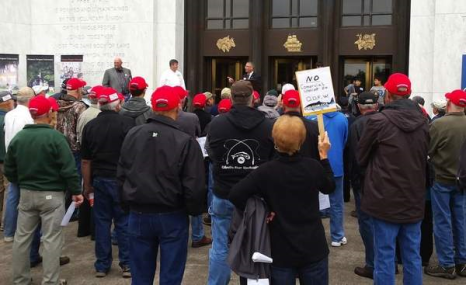 The sportfishing industry raised an outcry after Gov. Kate Brown announced last month the appointment of Astoria resident Bruce Buckmaster to fill a seat on the commission that has been vacant for two years. Sportfishers complained Buckmaster had opposed a plan that allocates more fish on the Lower Columbia River to anglers, and they pointed out that none of the current commissioners or Brown’s appointees work in the sportfishing industry. The Senate Committee on Rules nonetheless voted unanimously to send Buckmaster,,, Read the rest here 10:26
The sportfishing industry raised an outcry after Gov. Kate Brown announced last month the appointment of Astoria resident Bruce Buckmaster to fill a seat on the commission that has been vacant for two years. Sportfishers complained Buckmaster had opposed a plan that allocates more fish on the Lower Columbia River to anglers, and they pointed out that none of the current commissioners or Brown’s appointees work in the sportfishing industry. The Senate Committee on Rules nonetheless voted unanimously to send Buckmaster,,, Read the rest here 10:26

































